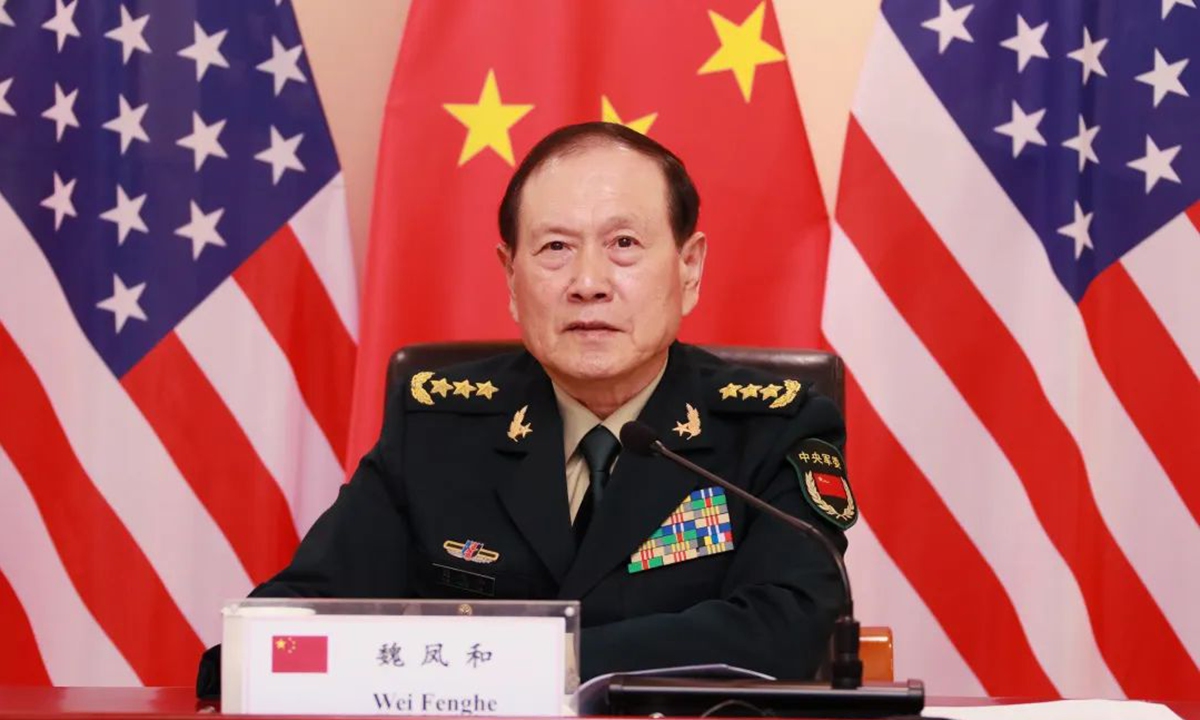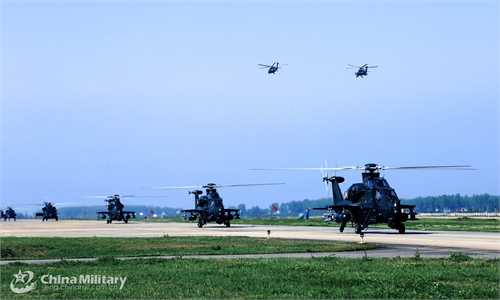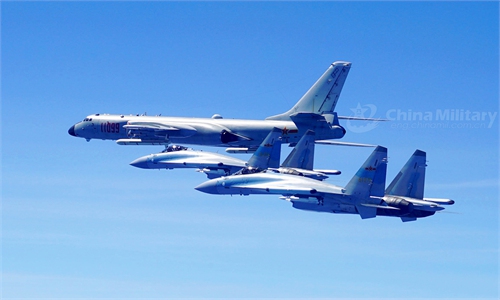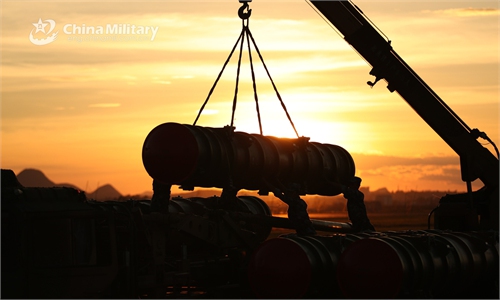Defense minister stresses China's resolve, warns against US provocations in ‘late’ first phone talk with Austin

Chinese State Councilor and Defense Minister Wei Fenghe
Chinese State Councilor and Defense Minister Wei Fenghe had a phone call with US Secretary of Defense Lloyd Austin on Wednesday at the latter's request, with Wei stressing the importance of the Taiwan question, while demanding the US to stop its military provocations at sea, and not to throw mud or threaten China with the Ukraine issue.
The dialogue, the first since Austin became US Defense Secretary in January 2021, will hopefully provide stability to the two countries' military-to-military ties and avoid and reduce misjudgments by letting the US better understand China's bottom line and core interests at a very challenging time in the China-US relations, analysts said.
Wei said that China and the US should implement the consensus reached by the two countries' top leaders in earnest, pledge mutual respect, coexist peacefully and avoid confrontation. The US should fulfill its promise of not seeking a new Cold War with China, should not aim to change China's system, the revitalization of its alliances should not target China, that the US does not support "Taiwan independence," and that it has no intention to seek a conflict with China.
China hopes to build a sound and steady major power relationship with the US, and it will also safeguard its national interests and dignity. The US should not underestimate China's determination and capability, Wei said.
The two countries' militaries should enhance mutual trust, boost conversation and communication, manage and control risks and crises, and carry out pragmatic cooperation to ensure the normal, steady development of the two countries' military-to-military relations, Wei said.
Wei stated a solemn position over the Taiwan question, as he stressed that Taiwan is an inalienable part of China, and this is a fact and a status quo no one can change.
It will bring a disruptive impact on China-US relations if the Taiwan question is not handled well, and the Chinese military will resolutely safeguard national sovereignty, security and territorial integrity, Wei said.
Austin said that the US is willing to promote the implementation of the important consensus reached by the two countries' top leaders, and it will enhance exchanges and cooperation in the military field with a sincere and open attitude.
The US stays committed to the one-China policy, Austin said.
Both sides should manage and control competition and risks with responsible manners, and deal well with challenges that the military ties between the two countries are facing, the US defense secretary said.
The biggest significance of the dialogue between two countries' defense ministers is that China and the US could avoid and reduce misjudgments by better understanding each other's bottom lines and not challenge each other's core interests, Song Zhongping, a Chinese military expert and TV commentator, told the Global Times on Wednesday.
China does not seek hegemony but it will not allow the US to challenge its red lines in terms of core interests, Song said.
Hopefully, the talk can provide stability for the two countries' military-to-military ties and a resumption of high-level military communications, Song said.
The defense ministers' talk came after a video call between the two countries' top leaders in March, which was deemed constructive, and teams from both countries were directed to promptly follow up and take concrete actions to put China-US relations back on the track of steady development, the Xinhua News Agency reported at the time.
China-US relations have been in a very difficult time, with all kinds of challenges stacked together, but the two countries' leaderships know they have wide and deep common interests, and those cannot be ignored because of the challenges, a Chinese expert on foreign affairs told the Global Times on Wednesday, requesting anonymity.
Wei and Austin's phone call is a chance to enable the two militaries to better understand each other's strategic intent and enhance the management of tensions in places like the South China Sea and the Taiwan Straits, the expert said.
China warned the US that is should not go further on the Taiwan question, not to mention supporting "Taiwan independence" forces, as this is a major question of principle that involves national sovereignty, security and development interests, Song said. China must make clear its bottom line to the US in order to safeguard peace and stability, and the Chinese mainland has the legal basis, the capability and the determination to resolve the Taiwan question, including by force, he said.
The Chinese People's Liberation Army (PLA) Eastern Theater Command on Friday organized multi-services and arms, dispatching forces including destroyers, frigates, bombers and fighters, and conducted joint combat alert patrols and drills including a maritime assault, in the forefront of the East China Sea and in waters and aerial areas around the island of Taiwan, when a group of US lawmakers were visiting the island.
A total of 11 PLA aircraft, namely a Y-8 electronic warfare aircraft, two H-6 bombers, a KJ-500 early warning aircraft and seven J-16 fighter jets, entered the island of Taiwan's self-proclaimed southwestern air defense identification zone on Wednesday, Taiwan's defense authority said on the day.
Wei and Austin exchanged views over air and maritime safety issues, with China demanding the US to stop making military provocations from the sea.
China and the US have already established mechanisms for the safety of air and maritime encounters, but the US military has been increasing close-in reconnaissance operations on China with aircraft and vessels, Song said.
In 2021, US large spy planes carried out about 1,200 aerial close-in reconnaissance sorties on China, with US aircraft carrier strike groups, amphibious ready groups and nuclear-powered attack submarines repeatedly entering the South China Sea, according to the monitoring by the South China Sea Strategic Situation Probing Initiative, a Beijing-based think tank.
This increases the risk of an accident and could lead to serious consequences, and the US must stop making such provocations, or the Chinese military would have to deal with them, experts said.
The two defense ministers also discussed the situation in Ukraine, and China urged the US not to use the Ukraine issue to throw mud at, threaten and pressure China.
First conversation
This is the first time Wei and Austin have had a direct conversation since Austin became Pentagon chief, observers noted.
In May 2021, Western media reported that Austin had yet to talk to Chinese military leaders "despite repeated attempts," but that was because Austin, in an unprofessional and unfriendly act of disregarding diplomatic protocol and international common practice, requested to meet with Xu Qiliang, vice chairman of the Central Military Commission, instead of Wei, sources told the Global Times at the time.
This time, it was also the US side that proposed the call, but with the right person, observers pointed out.
A reason why the US requested the call is probably because the US acknowledges China as its greatest strategic competitor, but in the meantime the risk of a real conflict must be avoided, analysts said.
Another reason is that the US might want China's help with the Ukraine crisis, and put pressure on China over its ties with Russia amid the Ukraine crisis, but its attempt to sow discord between China and Russia is bound to be futile, Song said.
China-US relations, as the most important relations in the world, have big influence potentials on the Russia-Ukraine issue, Song pointed out, noting that the US is fanning the flames and stirring up troubles at the cost of the Russians, Ukrainians and Europeans to serve its own hegemonic interests, and China on the other hand is promoting talks and peace.
The anonymous foreign affairs expert said that the US might be worried whether China could have some sorts of military coordination and cooperation with Russia.
China's Ministry of Foreign Affairs has repeatedly said that it is disinformation from the US that Russia has asked China for military assistance, and China's position on the Ukraine issue is consistent and clear, as China has been playing a constructive part in promoting peace talks.




